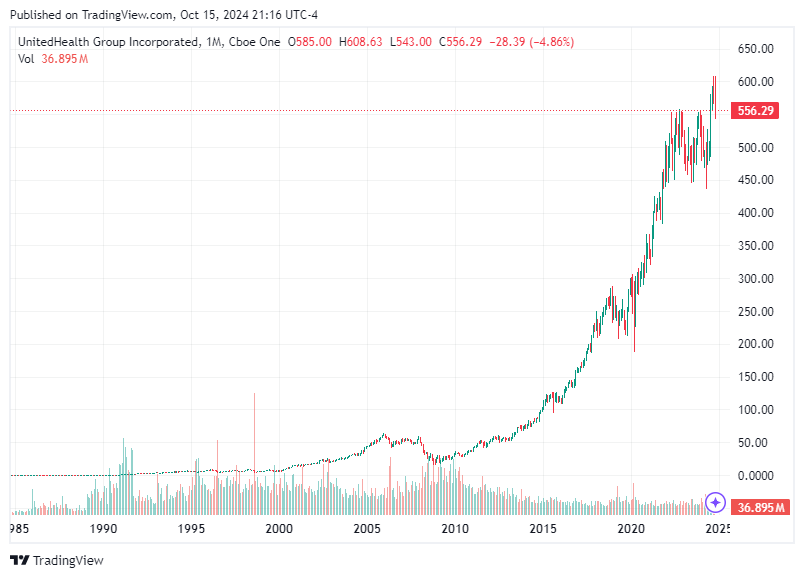UnitedHealth Projects Lower 2025 Earnings: Shares Decline
UnitedHealth's Projected Earnings Decline and Market Impact: A Comprehensive Analysis.

Disclaimer: This article is intended for informational purposes only and does not constitute financial advice. The views and opinions expressed herein are those of the author and do not necessarily reflect the official policy or position of any organization. Readers are advised to conduct their own research before making any investment decisions.
UnitedHealth Group Inc., a leading player in the health insurance sector, recently made headlines with its announcement of a projected decline in earnings for 2025, which has consequently led to a notable drop in its share value. This development is crucial not only for the company itself but also for the broader healthcare sector, which often takes cues from UnitedHealth's financial health. As the company grapples with emerging challenges such as rising medical expenses and stricter federal reimbursement rules, investors and industry analysts are closely monitoring the situation to gauge its potential impacts.
Understanding the Projected Earnings Decline
UnitedHealth's announcement indicated that its adjusted earnings per share for 2025 are expected to peak at approximately $30, falling short of the $31.16 that analysts had anticipated. This forecast marks a rare deviation from the company’s usual practice, as UnitedHealth has historically met or exceeded Wall Street's expectations. The root causes of this earnings forecast are multifaceted, involving both internal operational adjustments and external regulatory pressures.
One of the primary factors contributing to the subdued earnings outlook is the increase in medical costs. After the initial phase of the COVID-19 pandemic, there was a surge in demand for elective surgeries and medical tests, as patients who had deferred healthcare began to return for necessary treatments. This resurgence has led to heightened expenditures in patient care, impacting the company's medical-loss ratio, a key indicator of spending efficiency. Furthermore, UnitedHealth's Chief Financial Officer, John Rex, pointed out assertive billing practices by hospitals and increased use of high-cost medications as additional contributors to rising expenses.
Complementing the pressure from medical expenses, UnitedHealth is also navigating the challenges posed by changes in federal reimbursement rules. The Biden administration has proposed revisions to the Medicare Advantage program, aiming to curb practices that insurers have historically used to enhance revenue. These changes are expected to result in lower payments from the government’s Medicare insurance program and cuts to state Medicaid programs, directly affecting UnitedHealth’s revenue streams.
Impact on UnitedHealth's Stock and Broader Healthcare Sector
Following the announcement, UnitedHealth shares experienced their most considerable intraday decline since March 2020, dropping by as much as 10.3%. This decline is not only a reflection of investor sentiment toward UnitedHealth but also signals broader apprehensions about the health insurance sector. The shares of rival companies such as Elevance Health Inc., CVS Health Corp., Humana Inc., and Centene Corp. also saw declines, indicating concerns that UnitedHealth’s challenges could have ripple effects across the industry.
UnitedHealth’s role as a bellwether for the sector means that its financial outlook can sway perceptions of the health insurance industry’s overall stability and growth prospects. Historically, the company has been viewed as a reliable performer, with its financial results often used as a benchmark for assessing broader market trends. In response to these challenges, UnitedHealth executives have highlighted multiple initiatives aimed at managing costs and navigating the evolving landscape. CEO Andrew Witty has emphasized a cautious approach to future forecasts, highlighting the need for operational efficiency and cost reduction. The company is actively seeking sustainable methods to streamline expenses while maintaining quality care for its beneficiaries.
Witty also noted that the 2024 guidance has been adjusted due to unforeseen expenses, such as those arising from a major cybersecurity breach within the Change Healthcare division, which UnitedHealth acquired in 2022. The breach's consequences have been more substantial than initially anticipated, further complicating the financial outlook. Despite these challenges, UnitedHealth's historical performance provides a context of resilience and adaptability. The company’s ability to adjust its methods in response to economic and regulatory changes has been a hallmark of its success. As it moves forward, UnitedHealth’s focus will likely remain on innovation in cost management and enhancing service delivery to navigate the complex healthcare environment.
UnitedHealth's recent announcement regarding its projected 2025 earnings has undoubtedly stirred the health insurance sector, raising questions about future performance trends and necessary adaptations. While the news has led to immediate impacts on stock values and investor sentiment, it also highlights the dynamic nature of the healthcare industry, where companies must continuously evolve to meet new challenges.
As UnitedHealth works to address rising medical costs and regulatory pressures, its strategies and outcomes will be closely watched by stakeholders across the healthcare landscape. The company's ability to manage these challenges effectively will not only influence its financial trajectory but also serve as a barometer for the sector at large.
Disclaimer: The information provided in this article is based on publicly available information and reflects the author's perspectives. It should not be considered as financial advice or a recommendation for investment. Readers should conduct their own analysis and consult with financial professionals before making any investment decisions.
We are working endlessly to provide free insights on the stock market every day, and greatly appreciate those who are paid members supporting the development of the Stock Region mobile application. Stock Region offers daily stock and option signals, watchlists, earnings reports, technical and fundamental analysis reports, virtual meetings, learning opportunities, analyst upgrades and downgrades, catalyst reports, in-person events, and access to our private network of investors for paid members as an addition to being an early investor in Stock Region. We recommend all readers to urgently activate their membership before reaching full member capacity (500) to be eligible for the upcoming revenue distribution program. Memberships now available at https://stockregion.net


